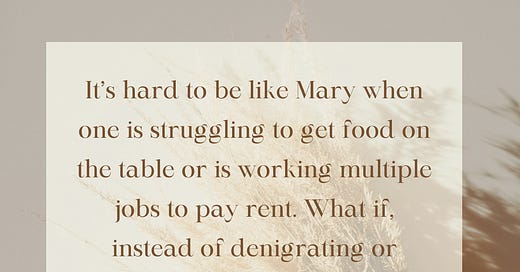Creating a Space for Martha
Luke 10:38-42
Many sermons in this passage tend to shame Martha. She’s often berated as uptight or as focusing on unimportant things, while Mary is the model to be emulated. Whenever I hear sermons that treat Martha as being somehow lesser because she is focusing on making sure the home was prepared, I can’t help but wonder, is Jesus really denigrating her, or are we, as a society imposing our own, often sexist and oppressive notions back on the text?
After all, the most marginalized are given the responsibility of performing the work that keep most of our homes and institutions running, and yet that very work is viewed as worthless. We see this in the ways in which women are expected to keep their houses running, take care of kids, and also work an outside job. If a mother works but isn’t doing a “good enough” job taking care of the house and kids, she’s viewed as shirking her responsibilities as a woman. But if she only takes care of the home and does not work a “regular” job, she’s viewed as being lazy.
Or let’s look at fast-food workers, cashiers, and other low waged laborers that literally keep society functioning. Their labor is often dismissed as “unskilled” and unimportant yet during the pandemic many were often forced to work and risk getting severely sick because their jobs were viewed as essential. And when restaurants, grocery stores, etc struggle to find workers and have to eliminate services, people lose their tempers. The work is invaluable and necessary but we treat those providing those services as expendable.
Going back to today’s lectionary gospel reading, we often interpret Jesus’ words as a sharp rebuke to Martha. But what if instead his words are a sigh of acknowledgment regarding how upside-down society’s priorities are, then and now. What if, we viewed Jesus’ words as directed not only toward Martha, individually, but towards society as a whole?
Society, then and now, places unfair expectations on the marginalized-whether it’s women, people of color, or the poor. Martha’s actions regarding what is expected of her, didn’t occur in a vacuum. She was putting into action expectations that she had internalized. Expectations that may have told her that it was her job to care for everyone all the time-especially in her own home. Expectations that said, she couldn’t afford to take a few minutes to sit and learn from Jesus, she needed to make sure that he and all his guests are taken care of. Her needs are of secondary importance.
What if, instead of us, reading into Jesus’ words a devaluing of Martha’s actions, we instead read into them liberation and freedom? Martha’s work is not unimportant, it is not worthless. In fact, Martha’s tireless work, was most likely necessary to keep her household functioning. Similarly, the work done by the marginalized in society keeps our homes and institutions running and yet is often disparaged. Our society demands their labor, yet refuses to appreciate it and fairly compensate them.
What if, Jesus's words to Martha are a challenge to a society that places such crushing expectations on the marginalized that they cannot rest? In many sermons, the punchline is to be like Mary. But there is often very little acknowledgment about how often being like Mary is a privilege reserved only for a few. It’s hard to be like Mary when one is struggling to get food on the table or is working multiple jobs to pay rent. What if, instead of denigrating or shaming the Marthas’ of the world, we create a society that provides them with the space to listen and rest?
Image: wheat. Text: It’s hard to be like Mary when one is struggling to get food on the table or is working multiple jobs to pay rent. What if, instead of denigrating or shaming the Marthas’ of the world, we create a society that provides them with the space to listen and rest?



